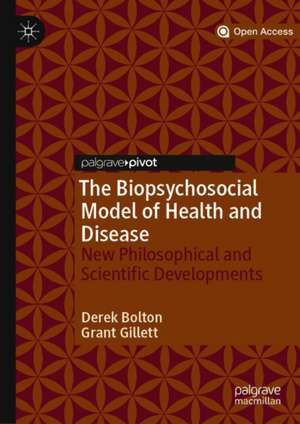The Biopsychosocial Model of Health and Disease: New Philosophical and Scientific Developments
Autor Derek Bolton, Grant Gilletten Limba Engleză Hardback – 7 apr 2019
The authors conceptualise biology and the psychosocial as in the same ontological space, interlinked by systems of communication-based regulatory control which constitute a new kind of causation. These are distinguished from physical and chemical laws, most clearly because they can break down, thus providing the basis for difference between health and disease. This work offers an urgent update to the model’s scientific and philosophical foundations, providing a new and coherent account of causal interactions between the biological, the psychological and social.
Preț: 141.81 lei
Preț vechi: 149.28 lei
-5% Nou
Puncte Express: 213
Preț estimativ în valută:
27.14€ • 28.40$ • 22.59£
27.14€ • 28.40$ • 22.59£
Carte disponibilă
Livrare economică 10-24 martie
Livrare express 21-27 februarie pentru 23.66 lei
Preluare comenzi: 021 569.72.76
Specificații
ISBN-13: 9783030118983
ISBN-10: 3030118983
Pagini: 139
Ilustrații: XIII, 149 p.
Dimensiuni: 148 x 210 x 15 mm
Greutate: 0.35 kg
Ediția:1st ed. 2019
Editura: Springer International Publishing
Colecția Palgrave Pivot
Locul publicării:Cham, Switzerland
ISBN-10: 3030118983
Pagini: 139
Ilustrații: XIII, 149 p.
Dimensiuni: 148 x 210 x 15 mm
Greutate: 0.35 kg
Ediția:1st ed. 2019
Editura: Springer International Publishing
Colecția Palgrave Pivot
Locul publicării:Cham, Switzerland
Cuprins
Part I. The biopsychosocial model: a diagnostic assessment.- Ch. 1. Much invoked – but deeply flawed?.- Ch.2. Locating the scientific and clinical content.- Ch. 3 The core theory problem: biopsychosocial causal interactions.- Ch. 4 The first step: updating the biomedical model.- Part II. Core non-reductionist concepts in biology and biomedicine.- Ch.5 Biology.- Ch.6 Physicalism.- Part III. Biology opens up to the BioPsychoSocial.- Ch.7 The Biomedical Model opens up to the Biopsychosocial.- Ch.8 The Psychological as Agency.- Ch.9 Conditions of Agency.- Ch.10 The socio-political : who gets to control what?.- Ch.11 Biopsychosocial systems.- Part IV. Biopsychosocial conditions of health and disease.- Chapter 12. Conditions of biological, psychological and social life.- Chapter 13. Biopsychosocial conceptualisation of health conditions.- Chapter 14. Locating causes in biopsychosocial systems.- Chapter 15. Compare and contrast physical and mental health conditions.- Ch.16 Locating the Biopsychosocial Model.
Notă biografică
Derek Bolton is Professor of Philosophy and Psychopathology at the Institute of Psychiatry, Psychology and Neuroscience at King’s College London, UK. He was awarded a double first in Moral Sciences and a PhD in Philosophy at the University of Cambridge. His subsequent professional career was in clinical psychology and he has published extensively in philosophy of psychiatry as well as basic and clinical health science.
Grant Gillett is Professor of Bioethics at the University of Otago, New Zealand. His professional career was in Neurosurgery, punctuated by a D. Phil. at Oxford University in philosophy of mind and meta-ethics. He has published extensively in neuroethics, philosophy of mind and language, philosophy of medicine (particularly psychiatry), and the philosophy of medical and social sciences.
Grant Gillett is Professor of Bioethics at the University of Otago, New Zealand. His professional career was in Neurosurgery, punctuated by a D. Phil. at Oxford University in philosophy of mind and meta-ethics. He has published extensively in neuroethics, philosophy of mind and language, philosophy of medicine (particularly psychiatry), and the philosophy of medical and social sciences.
Textul de pe ultima copertă
‘This is an incredibly audacious book. Derek Bolton and Grant Gillett brilliantly succeed in providing the big picture that was lacking in the defense of the biopsychosocial model promoted by Engel 40 years ago.’
This open access book is a systematic update of the philosophical and scientific foundations of the biopsychosocial model of health, disease and healthcare. First proposed by George Engel 40 years ago, the Biopsychosocial Model is much cited in healthcare settings worldwide, but has been increasingly criticised for being vague, lacking in content, and in need of reworking in the light of recent developments. The book confronts the rapid changes to psychological science, neuroscience, healthcare, and philosophy that have occurred since the model was first proposed and addresses key issues such as the model’s scientific basis, clinical utility, and philosophical coherence.
-Steeves Demazeux, Assistant Professor in philosophy, Bordeaux-Montaigne University, France
The authors conceptualise biology and the psychosocial as in the same ontological space, interlinked by systems of communication-based regulatory control which constitute a new kind of causation. These are distinguished from physical and chemical laws, most clearly because they can break down, thus providing the basis for difference between health and disease. This work offers an urgent update to the model’s scientific and philosophical foundations, providing a new and coherent account of causal interactions between the biological, the psychological and social.
Derek Bolton is Professor of Philosophy and Psychopathology at the Institute of Psychiatry, Psychology and Neuroscience at King’s College London, UK. He was awarded a double first in Moral Sciences and a PhD in Philosophy at the University of Cambridge. His subsequent professional career was in clinical psychology and he has published extensively in philosophy of psychiatry as well as basic and clinical health science.
Grant Gillett is Professor of Bioethics at the University of Otago, New Zealand. His professional career was in Neurosurgery, punctuated by a D. Phil. at Oxford University in philosophy of mind and meta-ethics. He has published extensively in neuroethics, philosophy of mind and language, philosophy of medicine (particularly psychiatry), and the philosophy of medical and social sciences.
Caracteristici
Offers a timely reworking and update of the biopsychosocial model
Confronts the current rapid changes to psychological science, neuroscience, healthcare, and philosophy
Addresses key issues such as the model’s scientific basis, clinical utility, and philosophical coherence
Confronts the current rapid changes to psychological science, neuroscience, healthcare, and philosophy
Addresses key issues such as the model’s scientific basis, clinical utility, and philosophical coherence
